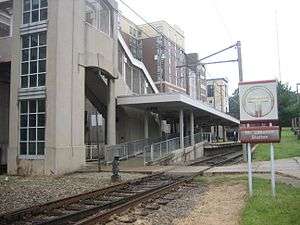Mt. Lebanon station
Mt. Lebanon is a station on the Red Line of the Port Authority of Allegheny County's light rail system, serving Mt. Lebanon, Pennsylvania. Opened in 1987, as of 2005 it serves an average of up to 2,000 passengers a day through both rail and bus connections.[2]
Mt. Lebanon | |||||||||||
|---|---|---|---|---|---|---|---|---|---|---|---|
 Mt. Lebanon station in 2016, looking north from Shady Drive East | |||||||||||
| Location | Shady Drive East and Alfred Road Mt. Lebanon, Pennsylvania | ||||||||||
| Coordinates | 40.38236°N 80.04329°W | ||||||||||
| Owned by | Port Authority | ||||||||||
| Platforms | 1 island platform | ||||||||||
| Tracks | 2 | ||||||||||
| Connections | Port Authority bus routes 38, 41 and 42 | ||||||||||
| Construction | |||||||||||
| Parking | 24 spaces | ||||||||||
| Disabled access | Yes | ||||||||||
| History | |||||||||||
| Opened | 1987 | ||||||||||
| Traffic | |||||||||||
| Passengers (2018) | 559[1] (weekday boardings) | ||||||||||
| Services | |||||||||||
| |||||||||||
| Location | |||||||||||
 | |||||||||||
History
.jpg)
Prior to the construction of the Pittsburgh Light Rail system, the area around the present-day Mt. Lebanon station was served by the Clearview Loop station, located a short distance from the present-day station on Alfred Road on a balloon loop that served as the terminus for the 38 Mt. Lebanon trolley service operated by Pittsburgh Railways.[3] On May 26, 1963, the 38 Mt. Lebanon was replaced by the 42/38 Mt. Lebanon via Beechview service which extended the previous 42 Dormont trolley service to Mt. Lebanon from Dormont Junction.[4]
Planning for the present-day Mt. Lebanon station began in 1979, alongside planning for the Mt. Lebanon Tunnel.[5] As construction of the tunnel progressed, Clearview Loop services were terminated on April 15, 1984, with the loop and the trolley tracks on Washington Road subsequently removed and affected routes replaced by corresponding bus service. To celebrate the closing of the station and the impending opening of the new light rail system, a "Trolley Day" was held on Washington Road the night before to commemorate the over eighty years of trolley service to and from Mt. Lebanon.[3]
The station was scheduled to be opened on Thanksgiving Day, November 28, 1984,[3] but completion of the station was delayed owing to delays in the release of federal subsidies, compounded by construction problems. Service ultimately began on May 22, 1987, completing Pittsburgh's first modern light rail line.[6]
The station's air rights were later sold to the municipal government of Mt. Lebanon on November 20, 1987 for $485,000 to allow for commercial development on the stretch of Washington Road immediately above the station, including direct station access to Washington Road, office and residential housing units, and the construction of a new 500-slot municipal-owned parking garage,[7] replacing an existing parking garage that was built in the 1950s.[8] Construction of the parking garage was not without controversy, with the original proposal being shelved in 1989 due to a lack of financing, a reduced 350-slot garage being shelved in 1991, and an even smaller garage, with room for 262 cars and a direct connection to the station, ultimately being opened in February 1994.[9]
In July 2016, a contract was awarded for an upcoming facelift of the station — part of an $830,000 program to improve both the station and the two municipal-owned parking garages on Washington Road as part of the final phase of a five-year capital improvement plan.[10]
Facilities and connections
The station features a small 24-slot parking lot, making it a minor stop for park and ride commuters. A bike rack was also installed when the station was constructed.[11]
It is located one block from Mt. Lebanon's busy Washington Road corridor, which is lined with business and office parks. Walkways connect the station with one of two municipal-owned public parking garages on Washington Road, also popular with commuters. Bus service connects many major residential streets directly with the station.
In 2008, three of the station's walls were painted with murals commemorating the 250th anniversary of the city of Pittsburgh.[12]
References
- "System Map Winter 2018". Port Authority.
- Pace, Laura (July 14, 2005). "Some in Mt. Lebanon envision community built around transit". Pittsburgh Post-Gazette. PG Publishing Co., Inc. Retrieved July 20, 2016.
- Deasy, Deborah (March 29, 1984). "Trolley Day to mark end for the 42/38". The Pittsburgh Press. E. W. Scripps Company. Retrieved July 28, 2016 – via Google News.
- "Mt. Lebanon Gets Another Trolley Run". The Pittsburgh Press. E. W. Scripps Company. May 17, 1963. Retrieved July 31, 2016 – via Google News.
- Schmitz, John (May 21, 1979). "Subway To Hush Trolley in Mt. Lebanon". The Pittsburgh Press. E. W. Scripps Company. Retrieved July 28, 2016 – via Google News.
- Fisher, Ken (May 27, 1987). "Commuters have mixed views on the new LRT service". Pittsburgh Post-Gazette. Block Communications, Inc. Retrieved July 28, 2016 – via Google News.
- Grata, Joe (November 21, 1987). "PAT to sell property at Mt. Lebanon rail station for development". The Pittsburgh Press. E. W. Scripps Company. Retrieved July 28, 2016 – via Google News.
- Tkach, Harry (January 18, 1990). "Mt. Lebanon to close parking garage today". Pittsburgh Post-Gazette. Block Communications, Inc. Retrieved July 29, 2016 – via Google News.
- Tkach, Harry (March 22, 1995). "Garage losses less than expected". Pittsburgh Post-Gazette. Block Communications, Inc. Retrieved July 29, 2016 – via Google News.
- Crompton, Janine (July 15, 2016). "LRT station, 2 garages in Mt. Lebanon to get upgrades". Pittsburgh Post-Gazette. PG Publishing Co., Inc. Retrieved July 20, 2016.
- Grata, Joe (April 30, 1997). "PAT could install racks for bicycles". Pittsburgh Post-Gazette. Block Communications, Inc. Retrieved July 29, 2016 – via Google News.
- Sciullo, Maria (August 28, 2008). "Color to brighten commute in murals on inn, T station". Pittsburgh Post-Gazette. PG Publishing Co., Inc. Retrieved August 19, 2019.
External links
| Wikimedia Commons has media related to Mt. Lebanon (PAT station). |